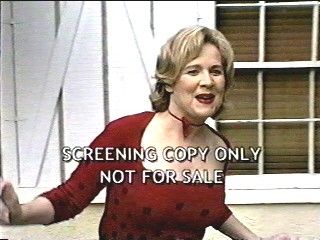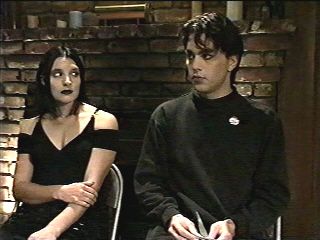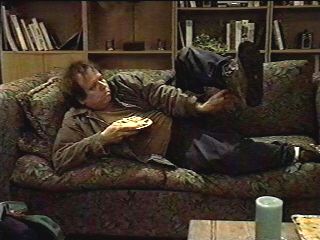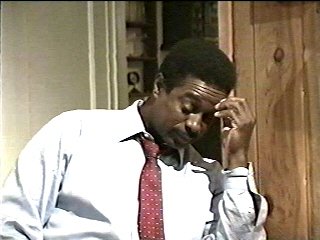
|
|
|
|
|
|
|
|
|
|
|
|
|
(2003) Director: Dave Eisenstark & Fred
Burke
Everybody these days is making a movie but me. Why, why can't I make my own movie? Sorry, forgot I was an adult for a moment. Anyway, given how grueling the art of filmmaking often is, I think I would rather keep spending my weekends and other times of freedom watching and reviewing movies instead of making them. But as difficult as filmmaking may be, it's certainly a lot easier in many aspects than it was even just a few years ago. That's partially because of the introduction of the digital video camera to the home market - affordable, lightweight, and easy to use. Then there is also the fact that PCs that are powerful enough to be used for movie editing are now affordable and available to the general public, along with the necessary software packages. So there's been an explosion in the number of truly independent movies being made, as the explosion of the number of independent film festivals all over the continent illustrates. Though it's still a rough ride out there for independent filmmakers; a lot of these film festivals lean towards "independent" films with some kind of major backing (money and/or personnel), which even the legendary Sundance festival is falling spell to. Then there is the fact that these films are often a hard sell to cable or video stores. But there's hope with the future. With the continued rise of technology and the Internet, I predict one day these truly independent filmmakers will be able to offer quick and high-quality downloads of their movies directly to the consumer, getting around the problem of distribution once and for all. Until then, all I can advise truly independent
filmmakers is to keep going, and never give up. Don't give up making
movies. And don't give up It doesn't take very long for Wednesday
to make its first serious misstep. In fact, it happens in the first
minute or so of the movie, passing over the fact that the
comically-animated opening title credits displayed several seconds
earlier loudly suggest that the sense of humor in this movie is going
to be far from subtle. The movie does not show Dee getting
inspired and creating her own group - instead, the movie tells
us. We get several sentences printed on the screen that immediately
tell us who the central character of the movie is, some facts about
her, what she has decided to do, and why she has decided to do so. This
kind of setup is a dubious choice on more than one level. The first and
obvious one is that it can smack of laziness, as if the filmmaker
couldn't be bothered to take the time to construct several scenes
showing what this situation evolved from. Second,
Now, the choice the movie made in opening the movie right at the beginning of the first group meeting wasn't necessarily a disastrous one. The movie could still have worked. It would just have had to figure out a way to show enough of Dee's character over the course of the movie, as well as the other participants of these group meetings, whom we know absolutely nothing about when we first see them arriving in the second minute of the movie for their first group meting. But in fact, after several more of these weekly meetings, we know little more about these characters than we learned in the first meeting. And it's not like the first meeting tells us that much in the first place. One of the things we do learn in that first meeting is that many of the characters are little more than extremely exaggerated cartoon characters that happen to be flesh and blood. A failed wannabe musician (played by David Grammer) is the classic couch potato slob, when not bursting into Broadway show tunes at seemingly random moments. The shy environmentalist (Peter Szumlas) spends most of his time at the meetings displaying carefully drawn environmentally-friendly innovations of his to the other members of the group. The gothic bulimic chick (Madison Wells), when not yelling various hateful and blunt statements, is seen constantly running to the toilet to throw up, and even the dubbed-in sound effects we hear each time we witness this unpleasant exercise sound straight out of something you'd hear from a Spike & Mike offering. Maybe these kind of things would be funny in a cartoon,
especially one that's short and not exactly demanding a lot of plot.
But in this particular context, it's deadly. The movie wants to have
its cake and eat it as well - The one exception is with the character of the undercover reporter. He is portrayed completely seriously, both with whatever he chooses to say and with how he reacts to the crazy people around him (not that far removed from how any home viewer will be reacting, by the way.) Without any extraneous silly material to hold him back, Hicks is able to give a pretty credible performance, with nothing in his speech or body language feeling the least bit contrived. The other members of the cast also show talent, but only the few times that the movie stops trying to be so farcical, so forced, so loud. In the second half of the movie, the movie stops being so frantic for several sequences, and it's here that the actors can practice their craft seriously, and be taken seriously. Take the scene when the arrogant jerk (Roger Ranney) offers to drive the homeless woman home when her car won't start. It's a compelling scene, because you can sense her rising embarrassment and shame the closer her secret gets to being revealed, and Ranney gives reactions believable (even for someone who was coming off as an arrogant jerk) towards her before and after the secret is revealed. The whole scene seems to come from a completely different movie. In fact, seeing how the movie was directed by two
people, I couldn't help but wonder Check
for availability on Amazon (DVD) See also: Completely Totally Utterly, Lethal Force, 23 Hours |
 trying to spread the
word about them - keep thinking of ways to publicize them. That's what
writer/director Dave Eisenstark (Creepozoids, Hack-O'-Lantern)
did recently, offering me a screening copy of his latest movie, The
Wednesday Night Save-The-World Society. I should point out that
it helped that the description he gave me of the movie made it sound
like it was a bona fide real movie, instead of one of those
namby-pamby independent art movies nobody cares about where characters
with tortured lives talk over coffee. Actually, the majority of the
people in this movie do lead tortured lives, but the difference
is that it's played out as a comedy, a satiric look at group support
and certain character types commonly found in this day and age. Dee
Barnes (De Sosa, Delta Force II), a middle-aged woman
in the Los Angeles area finding various difficulties in her unmarried
self, is inspired one day by a radio report to form her own discussion
group, "to break down feelings of isolation and helplessness," as she
puts it in one point. Her ad in the local paper brings various types to
her group, among them a gothic chick, a shy environmentalist, a
housewife secretly living in her car, and an arrogant jerk who thinks
he's God's gift to women. Naturally, it's extreme chaos with all these
different personalities butting heads with each other ever week
meeting, not helped by the fact they find their meetings being written
up in the newspaper, due to the fact one of the group participants
(former football player Hicks) is actually an undercover reporter
investigating this new discussion group phenomenon.
trying to spread the
word about them - keep thinking of ways to publicize them. That's what
writer/director Dave Eisenstark (Creepozoids, Hack-O'-Lantern)
did recently, offering me a screening copy of his latest movie, The
Wednesday Night Save-The-World Society. I should point out that
it helped that the description he gave me of the movie made it sound
like it was a bona fide real movie, instead of one of those
namby-pamby independent art movies nobody cares about where characters
with tortured lives talk over coffee. Actually, the majority of the
people in this movie do lead tortured lives, but the difference
is that it's played out as a comedy, a satiric look at group support
and certain character types commonly found in this day and age. Dee
Barnes (De Sosa, Delta Force II), a middle-aged woman
in the Los Angeles area finding various difficulties in her unmarried
self, is inspired one day by a radio report to form her own discussion
group, "to break down feelings of isolation and helplessness," as she
puts it in one point. Her ad in the local paper brings various types to
her group, among them a gothic chick, a shy environmentalist, a
housewife secretly living in her car, and an arrogant jerk who thinks
he's God's gift to women. Naturally, it's extreme chaos with all these
different personalities butting heads with each other ever week
meeting, not helped by the fact they find their meetings being written
up in the newspaper, due to the fact one of the group participants
(former football player Hicks) is actually an undercover reporter
investigating this new discussion group phenomenon. it gives us less of a
feel for the main character; plunging a character we barely know
anything about immediately into action makes it more difficult to
decide what to think about him or her than if we had been previously
been given several minutes of this character doing various other things
before getting involved. And in the case of Wednesday,
there is one other thing to consider; it robs the movie of potentially
funny moments. Think of Dee getting into a tizzy about her personal
problems; listening to the radio report; even planning and submitting
the ad in the newspaper. A satirical edge could be found in such
things, giving us humor while also giving us some insight into this
character.
it gives us less of a
feel for the main character; plunging a character we barely know
anything about immediately into action makes it more difficult to
decide what to think about him or her than if we had been previously
been given several minutes of this character doing various other things
before getting involved. And in the case of Wednesday,
there is one other thing to consider; it robs the movie of potentially
funny moments. Think of Dee getting into a tizzy about her personal
problems; listening to the radio report; even planning and submitting
the ad in the newspaper. A satirical edge could be found in such
things, giving us humor while also giving us some insight into this
character. it's trying to find
the funny side of real problems real people have, but any possibility
of the movie working as a human comedy is ruined by its frequent
turnaround into farce. And with those one-note caricatures I mentioned,
not a particularly clever level of farce. There's nothing automatically
funny anymore about a couch potato, or a woman dressed in black who
thinks morbid thoughts. As I've said before about this kind of thing,
you have to take it further, even if it's just presenting the
stereotype in a fresher angle that audiences won't be as familiar with.
The other characters in the movie are fortunately nowhere as
stereotyped, though for the most part they have some kind of
character attribute that pops up now and then to make them commit acts
of uninspired farce - the homeless lady (Mary Margaret Robinson)
several times abruptly grabs Dee's vacuum cleaner and start vacuuming
around the house, for example.
it's trying to find
the funny side of real problems real people have, but any possibility
of the movie working as a human comedy is ruined by its frequent
turnaround into farce. And with those one-note caricatures I mentioned,
not a particularly clever level of farce. There's nothing automatically
funny anymore about a couch potato, or a woman dressed in black who
thinks morbid thoughts. As I've said before about this kind of thing,
you have to take it further, even if it's just presenting the
stereotype in a fresher angle that audiences won't be as familiar with.
The other characters in the movie are fortunately nowhere as
stereotyped, though for the most part they have some kind of
character attribute that pops up now and then to make them commit acts
of uninspired farce - the homeless lady (Mary Margaret Robinson)
several times abruptly grabs Dee's vacuum cleaner and start vacuuming
around the house, for example.  if just one of the directors handled the
better scenes of the movie. There is a much different feeling to these
particular scenes, not just with the interesting fact that they
virtually all take place outdoors and away from Dee's living room. Not
every outdoor scene works, but even at their worst they're still a
welcome relief from having to watch another endless scene of these
characters crammed together in Dee's living room. Oh, towards the end
of the movie there are a few good moments with them, mostly surrounding
Robinson's character after her secret is revealed. But it relieves
little of the pain these same characters generated for the previous
hour or so with their past weekly discussions. As I said earlier, we
learn almost nothing about these characters week after week of these
meetings. There's no personal touch, no real emotion to anything they
say. When not speaking like the cartoon characters they may be, they
jump from topic to topic seemingly at random, sometimes even before
they are seemingly finished the previous topic. And virtually nothing
they say is the least bit funny or thought-provoking. In fact, thinking
back on the movie, it's hard to recall anything specific they were
talking about, given how utterly unmemorable (except for the pain) it
all is. Wednesday has a lot to say, but I can't imagine
anyone being interested in hearing any of it. The fact that it won a
best feature award at the MiniDV Film Festival in Hollywood doesn't
make me reconsider; it just makes me wonder what the rest of the
competition was like.
if just one of the directors handled the
better scenes of the movie. There is a much different feeling to these
particular scenes, not just with the interesting fact that they
virtually all take place outdoors and away from Dee's living room. Not
every outdoor scene works, but even at their worst they're still a
welcome relief from having to watch another endless scene of these
characters crammed together in Dee's living room. Oh, towards the end
of the movie there are a few good moments with them, mostly surrounding
Robinson's character after her secret is revealed. But it relieves
little of the pain these same characters generated for the previous
hour or so with their past weekly discussions. As I said earlier, we
learn almost nothing about these characters week after week of these
meetings. There's no personal touch, no real emotion to anything they
say. When not speaking like the cartoon characters they may be, they
jump from topic to topic seemingly at random, sometimes even before
they are seemingly finished the previous topic. And virtually nothing
they say is the least bit funny or thought-provoking. In fact, thinking
back on the movie, it's hard to recall anything specific they were
talking about, given how utterly unmemorable (except for the pain) it
all is. Wednesday has a lot to say, but I can't imagine
anyone being interested in hearing any of it. The fact that it won a
best feature award at the MiniDV Film Festival in Hollywood doesn't
make me reconsider; it just makes me wonder what the rest of the
competition was like.